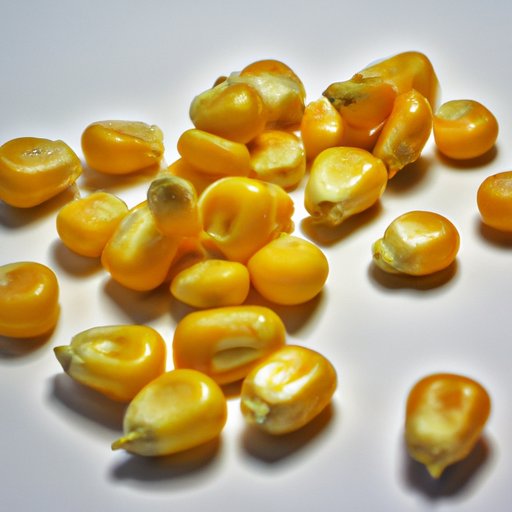Introduction
The question of whether corn is a healthy food has been debated for years. On one hand, corn is an excellent source of fiber and contains a variety of vitamins and minerals. On the other hand, it is high in calories and carbohydrates, and some experts argue that it should be avoided. In this article, we will explore the health benefits and risks associated with eating corn and provide recommendations for incorporating it into a healthy diet.
Exploring the Benefits of Eating Corn
Corn is a popular ingredient in many dishes, as it is versatile and can be used in a variety of ways. It is also a significant source of nutrition, containing dietary fiber, vitamin B6, magnesium, phosphorus, and iron. Additionally, it is low in fat and sodium and contains no cholesterol.
According to research published in the journal Nutrients, corn is a good source of antioxidants, which can help protect against oxidative damage caused by free radicals. The study found that corn is particularly rich in polyphenols, a type of antioxidant that has been linked to a reduced risk of cardiovascular disease, cancer, and other chronic diseases.
Corn also contains lutein and zeaxanthin, two carotenoids that are beneficial for eye health. Studies have shown that consuming foods rich in these compounds may reduce the risk of age-related macular degeneration and cataracts.

The Pros and Cons of Eating Corn
Like any food, there are both pros and cons to consuming corn. One potential downside is that corn is high in calories and carbohydrates, which can make it difficult to fit into a healthy diet. Additionally, much of the corn available today is genetically modified, which may raise safety concerns.
However, when consumed in moderation, corn can be a beneficial addition to your diet. According to registered dietitian and nutritionist Rachel Fine, “Including corn as part of a balanced diet can be a great way to get a variety of essential vitamins and minerals, as well as fiber.”

A Nutritional Analysis of Corn
To understand the health benefits of corn, let’s take a closer look at its nutritional content. One cup of cooked sweet corn contains approximately:
- Calories: 177
- Carbohydrates: 39 grams
- Protein: 5 grams
- Fiber: 4 grams
- Vitamin C: 17% of the RDI
- Vitamin B6: 20% of the RDI
- Magnesium: 12% of the RDI
- Phosphorus: 16% of the RDI
- Iron: 4% of the RDI
As you can see, corn is an excellent source of fiber and several important vitamins and minerals. It is also relatively low in calories, making it a good option for those looking to lose weight.

How to Include Corn in a Healthy Diet
If you want to reap the health benefits of corn, it’s best to choose fresh or frozen varieties whenever possible. Canned corn typically contains added salt, so it’s best to avoid this option. Additionally, if you’re concerned about GMO corn, opt for organic varieties.
When preparing corn, try not to add too much butter or salt. Instead, opt for healthier toppings such as olive oil, herbs, and spices. Additionally, try to limit your portion size to one cup per serving.
Finally, make sure to pair corn with other nutrient-dense foods. For example, you could enjoy grilled corn on the cob with a lean protein and a side of vegetables. Or add corn kernels to a salad or stir-fry dish.
Conclusion
In conclusion, corn can be a healthy addition to your diet when consumed in moderation. It is an excellent source of dietary fiber, vitamins, and minerals, and studies have shown that it may offer protection against certain diseases. When choosing corn, opt for fresh or frozen varieties whenever possible and pair it with other nutrient-dense foods for a balanced meal.
By following these tips, you can enjoy the health benefits of corn without compromising your overall nutrition goals.
(Note: Is this article not meeting your expectations? Do you have knowledge or insights to share? Unlock new opportunities and expand your reach by joining our authors team. Click Registration to join us and share your expertise with our readers.)
